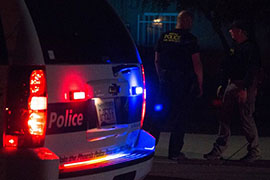- Slug: BC-CNS-Cops Video,790
- File photos available (thumbnail, caption below)
By Tori Gantz
Cronkite News
WASHINGTON – The sponsor of a law that would have made it a crime to videotape police conceded Friday that it will not take effect, after he failed to meet a deadline to challenge a court’s injunction of the law.
Rep. John Kavanagh, R-Fountain Hills, said he was not able to find lawyers to defend the law – after a string of state and local officials who might have defended it refused to do so.
“There’s nobody that’s going to come in to intervene to defend it,” Kavanagh said Friday. “So it’ll be enjoined.”
That would be welcomed by opponents of the law, which included civil rights groups and 10 different media organizations, who called the law “deeply problematic and unconstitutional.”
“We made three different arguments under the First Amendment and the court just found on the first one, and that was all that it needed … for this preliminary injunction,” said K. M. Bell, a staff attorney for the American Civil Liberties Union of Arizona.
HB 2319 was set to take effect on Sept. 24, but U.S. District Judge John Tuchi ruled on Sept. 9 that there is a “‘clearly established’ right to ‘record law enforcement officers engaged in the exercise of their official duties in public places’ under the First Amendment.” He issued a preliminary injunction of the law, but gave supporters until Friday to intervene.
The law would have made it a misdemeanor to “make a video recording of law enforcement activity if the person making the recording is within eight feet” of the officer. The law included exceptions for videotaping within 8 feet of police in a private building, if the person taping was in another room – or was told by police they were interfering. People who were being arrested or questioned by police could also tape the exchange – unless the police told them they were interfering.
Law enforcement activity, according to the law, would include police who were questioning or arresting someone, issuing a summons, otherwise enforcing the law or “handling an emotionally disturbed or disorderly person who is exhibiting abnormal behavior.”
Kavanagh, who has tried to pass similar bans on taping police in the past, has defended the effort, saying it is aimed at letting police do their jobs without interference.
Critics said the bill was likely unconstitutional, but it passed both the House and Senate on party-line votes and was signed into law by Gov. Doug Ducey on July 6.
That sparked the federal court challenge by the ACLU, the Arizona Broadcasters Association, the Arizona Press Association and a group of newspapers and TV stations from around the state.
The suit named Arizona Attorney General Mark Brnovich, Maricopa County Attorney Rachel Mitchell and Maricopa County Sheriff Paul Penzone as defendants – but all three distanced themselves from the law.
In court filings, Brnovich claimed he was not the proper target of the suit, and went on to say that he would “not oppose entry of a preliminary injunction” against the law. Mitchell and Penzone, likewise, said that opponents failed to show that the county officials “have enforced or threatened to enforce” the law and they took “no position” on the request for an injunction.
That left state lawmakers to defend the law, but that defense did not materialize.
In court, opponents argued that the law violated the First Amendment, by restricting a person’s ability to record police activity without a compelling reason to justify that restriction.
“It’s not lawful for the officer to tell you to stop recording just because he doesn’t want to be recorded,” Bell said.
They also argued that the law was poorly crafted and not necessary. And Tuchi agreed.
“Ostensibly, the aim of HB 2319 is to prevent interference with or distractions of law enforcement officers,” Tuchi wrote in his Sept. 9 order. “However, Arizona already has other laws on its books to prevent interference with police officers. Thus, HB 2319 is not ‘necessary,'”
With no one stepping up to challenge Tuchi’s order, the preliminary injunction takes effect, putting the law on hold until hearings can be held on a permanent injunction of the law, which Bell looks forward to.
“We are hopeful that the court will move swiftly towards granting a permanent injunction which we know will permanently make clear that this is an unconstitutional and unenforceable law,” Bell said.
While he conceded that he will not be able to block the injunction, Kavanagh said he will try again in the next legislative session.
“I’m going to be looking at the criticisms and the briefs and other sources of criticism,” Kavanagh said Friday. “I’ll be waiting for the judge’s written opinion. And in January, I will amend the law to deal with those issues.”
For more stories from Cronkite News, visit cronkitenews.azpbs.org.
^__=
Web links:
_ HB 2913: https://www.azleg.gov/legtext/55leg/2R/laws/0376.pdf
_ Ducey signing: https://apps.azsos.gov/apps/publicservices/LegislativeFilings/PDFs/2022/55th_Legislature_2nd_Regular_Session/CH_376.pdf
_ Preliminary injunction: https://www.scribd.com/document/595064119/Arizona-Broadcasters-v-Brnovich
_ Brnovich reply: https://www.scribd.com/document/595064525/Brnovich-Reply
_ Maricopa officials’ reply: https://www.scribd.com/document/595064875/Mitchell-Penzone-Reply
^__=
Media and civil rights groups appear to have been successful in their effort to block a new law that would have made it a crime to videotape police within 8 feet of an officer. A preliminary injunction by a federal court judge blocking the law looks like it will take effect without being challenged. (File photo by Tynin Fries/Cronkite News)
